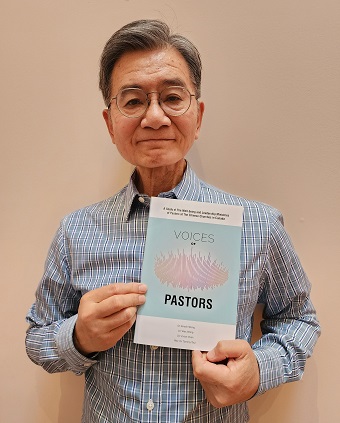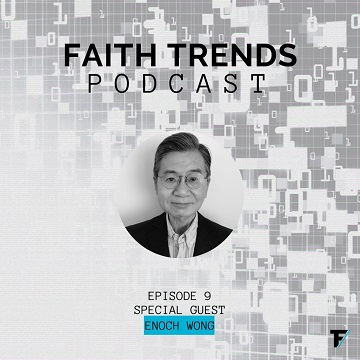
From left: Rev. Joe Chan (English Ministry Pastor of Capstan Alliance Church in Richmond); Rev. Genghis Chen (Assistant Superintendent of Canadian Pacific District of the Alliance Church); Rev. Tommy Tsui (contributor to Voices of Pastors); and Rev. Albert Mak.
Enoch Wong and three colleagues have created a book which will be of particular interest to the Chinese Christian community, but which – along with his other books – is of real value to the whole church, especially in the larger cities, with major Chinese Canadian communities.
Voices of Pastors is “a study of well-being and leadership ministries of pastors at the Chinese churches in Canada.”
Following are excerpts from the Preface, Introduction and Conclusion of the book.
Preface
The Centre for Leadership Studies at the Canadian Chinese School of Theology was established in 2016 with the objective of facilitating research into the critical issues related to the Chinese Church in Canada and beyond.
Through partnership with the Chinese Coordination Centre of World Evangelism – Canada, the Centre completed Listening to Their Voices that examines the faith journeys of the Canadian-born Chinese Christians, as well as the General Survey of the Chinese Churches in Canada (2019) that establishes the landscapes of the ministries of the Chinese churches in Canada.
[Free versions of both Listening to Their Voices and the General Survey of the Chinese Churches in Canada are available here.]
Upon the completion of these two studies, a desire to shift the spotlight to understand the well-being and the leadership ministries of the pastors was inspired by the publication of Barna’s The State of Pastors . . . .
A research project team was assembled to formulate the survey questionnaire that would make an inquiry specifically into the ministries of the pastors at the Chinese churches in Canada. The present report is the fruit of labour of a long journey of endeavour in this regard.
Introduction

Enoch Wong, with his new book, Voices of Pastors.
As reflected by Eugene Peterson, ministers enter their vocation unlike other regular occupations that carry demands of regular 9 – 5 office hours. Pastors are generally required to make themselves available to meet their flocks’ needs and provide pastoral care whenever or wherever that is required.
And unlike pastors of generations past, ministers in the 21st century need to be equipped on multiple fronts: attaining theological training and professional disciplines; learning the craft of leadership to lead and participate in ministerial teams of various forms; fostering a certain degree of self-awareness and maturity to address the need of their own well-being, body, mind and soul; being shaped by rigorous spiritual exercises to sustain and thrive in their ministries; and being savvy in mastering digital channels of delivering the gospel message.
And for the pastors at the Chinese churches in Canada, they typically have to labour in a sheep pen that is characterized by different languages (e.g., Cantonese, Mandarin, Taiwanese and English), subethnicities (e.g., Mainland Chinese, Taiwanese, Hong Konger, Hakka Chinese) and diverse cultures (e.g., regional cultures of the congregants of their countries of origins and the local-born Chinese) that come to define the complex nature of the Chinese immigrant churches in North America.
Shepherding and walking alongside their congregations, these pastors undoubtedly experience at times joy and satisfaction in the growth of their sheep, and at others need to share their pain and struggles along the journey and shouldering their burdens and challenges they face.
Apart from meeting the demands of ministries that are generally delivered at the church building such as worship services and Sunday school, pastors are encouraged to capture opportunities to serve and outreach to communities and the marketplace that are mostly in a multicultural, secular setting.
For this reason, pastors are often faced with the need to engage the ever-changing culture with the unchanging gospel, a challenge whose complexity requires a good grip of the cultural milieu as well as a fresh expression of faith.
The multi-faceted ministries pastors have to carry out only highlight the extraordinary demands and challenges they have to face. Against these backdrops, one may wonder about the following questions:
- How do the pastors at the Chinese churches in Canada carry out their ministries and remain faithful to their call?
- How do the pastors perceive their leadership ministries in the church as they engage in different teams, pastoral or lay?
- What excites them and, on the other hand, what frustrates them in the pastoral care for their congregants?
Facing the rising challenges of the younger, English-speaking generation, what might their level of engagement be and what barriers would they have faced? And finally, what might these pastors’ conditions be mentally, physically and spiritually, and who do they lean on for support and encouragement in seasons of dryness and stress?
With all these in mind, Voices of Pastors, a quantitative survey study, was launched . . . to explore the various aspects of the well-being, body, mind and soul, as well as the leadership ministries of the pastors at the Chinese churches in Canada.
Sponsored by multiple denominations and their respective Chinese associations, the survey, designed with 119 questions in three languages (English, Traditional Chinese and Simplified Chinese), was launched in the fall of 2020 to 587 ministers in the Chinese churches associated with these denominations, and to any other pastors referred through ministerial fellowships in the six metropolitan areas [including Metro Vancouver] across Canada. . . .
In sum, a total of 275 respondents completed the survey at the end of the data collection phase . . .
This report presents the results of this study in three broad sections. Under the theme of Self-leadership, Part I is organized with the following themes: Identity, Wholeness, Risk, Practices, Family, Friends, Money, Disorder, Humility and Calling.
Expanding the theme of Church-leadership, Part II reports the findings in the following chapters: Preparation, Governance, Leading, Communications, Women, Mentoring, Partnerships, Ministry Assessment: Strengths and Weaknesses and Ministry Assessment: Excitement and Frustration.
Finally, Part III covers the following topics: Cultural Trends, Issues and Challenges; Community Service, Intergenerational Ministry and Marketplace Ministry. Together these 23 chapters present the fabric of what makes up the pastors of the Chinese churches in Canada and their leadership ministries.
Conclusion
For the overall cohort, 29%, or 80, of the 275 respondents indicated they have less than ‘Good’ or ‘Excellent’ physical health, and 24%, or 66 of them, identified their mental health to be less than ‘Good’ or ‘Excellent.’
When the study looks further into the composite analysis of the Burnout Risk and Relationship Risk index, though 16%, or 44, of the respondents registered to have high Burnout risk, the rate increased to 29%, or 80 pastors if we include the additional 36 pastors who were found to have high-medium risk.
As the spotlight of our examination is turned to how the respondents stacked up on Relationship Risk, 21.5%, or 59, of the pastors of this study registered high Relationship Risk. The rate was boosted to ~37%, or 101 pastors if the 42 respondents who registered high-medium risk were included.
That said, only 5.5% of the cohort, 15 pastors, carried high Spiritual Risk and 9.5%, or 26 respondents registered high Financial Risk, though the rated jumped up to ~24%, or 50 pastors, and ~21%, or 57 pastors respectively for these two risks factors if pastors with High-Medium were included in the consideration.

The EFC’s Faith Trends podcast (https://soundcloud.com/faithtrends/second-generation-chinese-evangelicals) offers a good introduction to Enoch Wong’s thinking.
Though these risks may not have been found to be alarmingly high, it is an invitation to take steps to address the needs for the care of the pastors’ overall well-being.
Dr. Enoch Wong is Adjunct Professor of Diaspora Studies at Tyndale University in Toronto. His colleagues in producing Voices of Pastors are Dr. Wes Wong, Dr. Vivian Chan and Rev. Dr. Tommy Tsui.
These excerpts from Voices of Pastors are posted by permission.
Church for Vancouver posts about two of Enoch Wong’s other publications – Listening to Their Voices and How am I Going to Grow Up? – can be found here and here.
